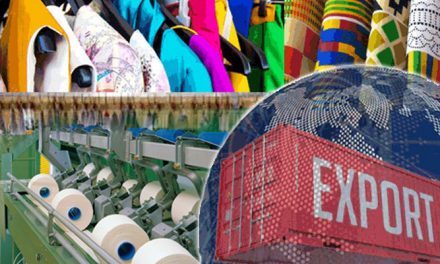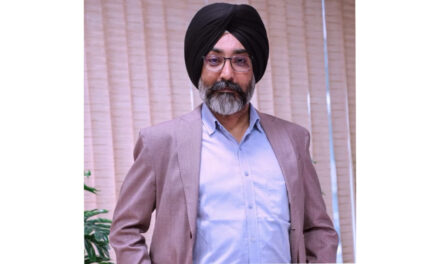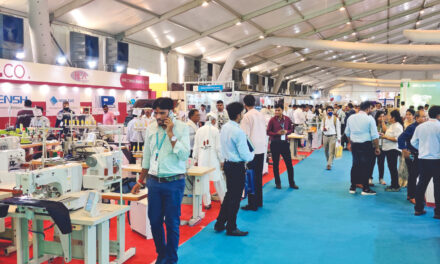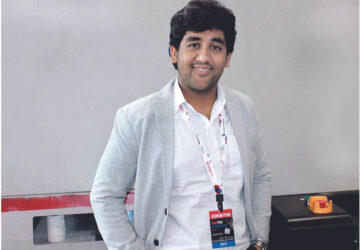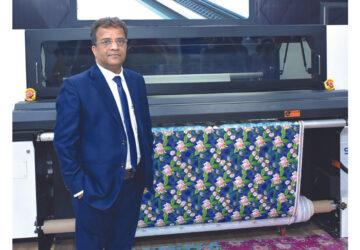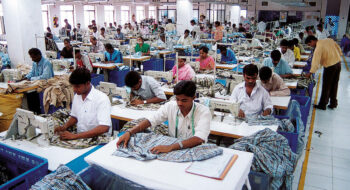 The outgoing Chairman of CITI, T Rajkumar delivered his address at the 65th Annual General Meeting (AGM) of the Confederation of Indian Textile Industry (CITI) to the members sharing the outlook on what he believes in the road ahead for the Indian textiles and apparel (T&A) industry.
The outgoing Chairman of CITI, T Rajkumar delivered his address at the 65th Annual General Meeting (AGM) of the Confederation of Indian Textile Industry (CITI) to the members sharing the outlook on what he believes in the road ahead for the Indian textiles and apparel (T&A) industry.
He said that it has been a challenging mandate in every respect possible. Unprecedented is almost an understatement due to the pandemic, However, I am so pleased to inform that the CITI team demonstrated tremendous leadership over the past four years and immediately embraced the opportunity to lead in responding to the pandemic crisis.
Prior to the new board taking over, Rajkumar complimented on proactive policy support from the Government of India as a result, India achieved its highest ever T&A exports (HSN 50 to 63) of US$ 43.4 Bn during 2021-22 which was about 41% higher than exports of US$ 30.9 bn during 2020-21. He opined that T&A industry across the globe has been facing unprecedented financial stress mainly due to stagnation in production and trade stemming from a multitude of reasons such as high volatility in raw material prices, uncertainties emerging due to geopolitical conflicts like the ongoing Russia-Ukraine war, reorientation of supply chains and high inflationary pressures in countries like USA, EU, etc. giving a setback on exports of T&A from India which declined by about 18% to reach US$ 35.7 bn during FY 23 as compared to FY 22.
He opined “The outlook is not entirely grim, the same can be seen in the latest trade figures released by the Ministry of Commerce which shows that after declining continuously for many months, India’s cumulative Exports of Textiles and Apparel during August‘23 have registered a growth of 4.33% over August’ 22 primarily led by a 14% increase in the Textile exports.
Rajkumar expressed the industry will surely bounce back strongly towards the goal to clock a US$ 350 bn market size including US$ 100 bn exports by 2030. The aggressive pace and scope of the recent FTAs which are either signed up such as India-UAE CEPA, India-Australia ECTA or are under negotiations with countries like EU, UK, and Canada are indicators of this.
He opined that the introduction of the Quality Control Orders (QCOs) for several textile products, including all the major textile fibres have posed challenges ; such as product coverage, testing facilities, licensing procedures and timelines, domestic availability, dependence on imports, etc. which has affected the production planning of the entire textile value chain, He opined that good news is that a consultative approach is being taken by the Government in this matter to address the issues flagged by the industry.
Major Policy Issues and Recommendations
Rajkumar opined that CITI has been aggressively pursuing the various underlying issues of the Textile and apparel industry in a time-bound manner. While under the leadership of Hon’ble Union Minister of Textiles, Piyush Goyal many of the issues of the industry have been resolved, there are yet several issues which need urgent intervention of the Government. Some of the issues that have been raised by CITI are:
• Removal of Import duty from cotton imports
• Revision of the Standard Input-Output Norms (SION) applicable for Viscose Staple Fibre Spun Yarn & its Blended Spun Yarn and MMF Blended Spun Yarns with Cotton
• Provide RoDTEP benefit on export of Cotton Yarn under Advance Authorization Scheme
• Exempting Bamboo and other Cellulosic Fibre not produced indigenously from the purview of VSF – QCO 2022
• Amending para 4.10 (i) of HBOP 2023 according to the provisions of GST Law
• Making submission of production data mandatory by the mills
• Rationalization of Goods & Service Tax (GST) on Man-Made Fibre and its Raw Materials to avoid Inverted Duty Structure
He expressed hope that the Government will soon resolve the other pending issues as well.
Major Developments in Cotton Textile Advisory Group (TAG)
He said the Government formed Cotton TAG with the participation of various stakeholders of the cotton value chain. CITI being one of the key stakeholders of TAG played the role of a think tank in resolving many of the issues of the cotton value chain, such as Restructuring of the MCX Cotton Contract Specifications to make it more representative: In this, a newly restructured MCX Cotton Future Contract was relaunched at MCX on 31st January 2023 and the trading on the same commenced from 13th February 2023 with the collaborative approach of the Government of India.
Augmenting Supply of Domestic Cotton: He complimented that CITI’s proposal Ministry of Agriculture & Farmers Welfare has initiated a Special Project on Cotton of ICAR-CICR titled ‘Targeting Technologies to agro-ecological zones – large scale demonstrations of best practices to enhance cotton productivity’ under NFSM during 2023-24. Ministry of Textiles is also part of the review and steering group of the project. The objective of the project is to boost cotton productivity in a cluster-based and value chain approach in Public Private Partnership (PPP) model.
Branding of Kasturi Cotton
CITI is actively participating towards the Traceability, Certification, and Branding of “Kasturi Cotton India” which is being implemented by TEXPROCIL in association with CCI.
Rajkumar opined that the industry’s aspirations in terms of an alternative flagship TUFS scheme should come through quickly and will have the required scope and mandate to address the need for scaling up and innovation. Also, the Industry is continuously requesting the Government for PLI 2.0 with lower investment thresholds and wider product coverage and the industry is hopeful for an announcement soon in this regard.
He further informed, the Government will surely listen to our request favorably towards support for the MSME-driven Indian Spinning sector on the following financial support:
• Extend a one-year moratorium for repayment of the principal amount;
• Convert three-year loans under ECLGS into six-year term loans;
• Extend necessary financial assistance to mitigate the stress on working capital, on a case-to-case basis.
Rajkumar appreciated the Government for considering requests such as a special one-time Amnesty Scheme for default in Export Obligations, focus on Infrastructure and logistics development, Paperless filing of export obligation discharge applications, more focus on Online approvals without physical interface and several others.
Rajkumar expressed gratitude to the Hon’ble Prime Minister of India, Narendra Modi Ji for listening to the Textile Industry’s pleas and taking many pathbreaking policy decisions for the betterment of Indian Textile & Apparel Industry.
Rajkumar also expressed gratitude to the Hon’ble Union Minister of Textiles, Commerce & Industry, Consumer Affairs, Food and Public Distribution, Piyush Goyal Ji, Hon’ble Union Minister of Finance, Smt. Nirmala Sitharaman, Darshana Vikram Jardosh Ji, Hon’ble Minister of State for Textiles, for extending all possible support and kind encouragement for the growth of the Textile Industry.
Rajkumar expressed sincere gratitude to Rachna Shah, Secretary, Textiles, who has been steering the Textile Industry in the right direction and addressing various underlying issues of the Textile and apparel Industry.



